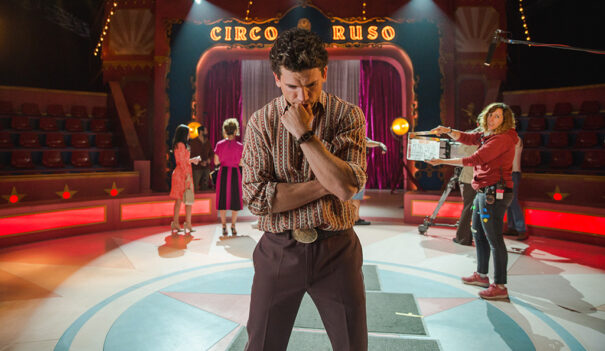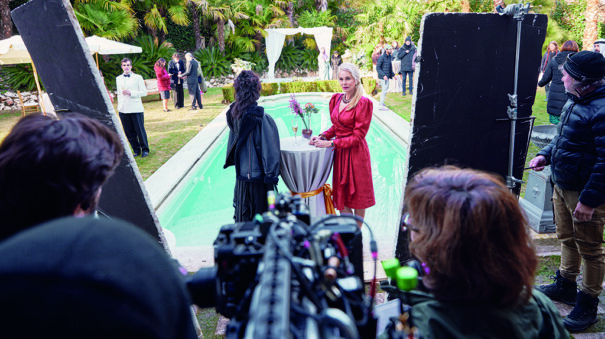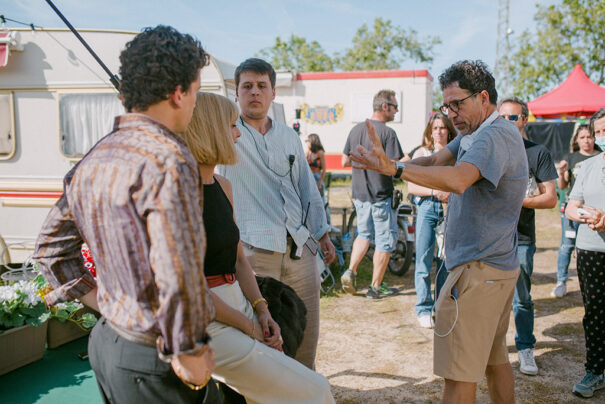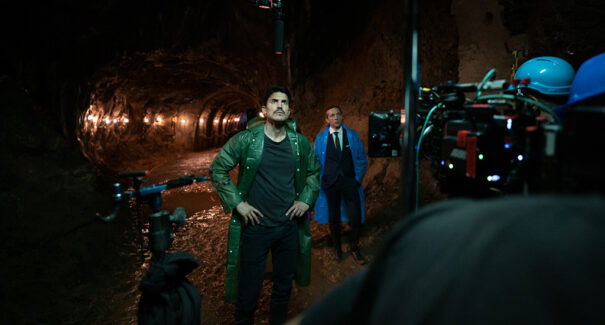Good Mood (Daniel Écija and Javier Lorenzo): franchises and brands, pillars of the future of series
Daniel Écija, producer and screenwriter, and Javier Lorenzo, general director, review the trajectory of Good Mood, analyse the current situation in the television series industry and look towards a future in redefinition, in which the creation of franchises stands as an opportunity within a context in which originals are no longer the priority of the large video-on-demand platforms.
Seven Lives, Family Doctor, The Serranos, A Step Forward, Paco's Men, The Boarding School, Aida, Red Eagle, Journalists or Vis a vis, and newer formats such as I'm Alive, The Fence, Debts, The Daily 4 stars or Christ and King, make up the very extensive curriculum of Daniel Écija, responsible for more than 30 series and 8 films, and winner of 9 Ondas Awards and an Academy Award for Best Executive Producer. A proper name for the first golden age of Spanish fiction, the one starring a Globomedia who drew millions of audiences in front of the television, began a new professional stage just seven years ago under the label of Good Mood.
With Javier Lorenzo as general manager and Écija as head of the creative area, Good Mood It was born in the midst of the evolution of the consumption habits of the Spanish population. With the complex mission of seeking its consolidation in the pandemic period, the production company chose from its genesis to opt for the path of differentiation by offering Innovative approaches in the approaches of his works, but without ceasing to focus on the spectator. This has led them to work with agents such as RTVE, Atresmedia or Prime Video, among others, in series, entertainment formats and even documentaries, seeking to maintain the complex balance between creativity and manage to carry out the Mass Market Excitement.
Perhaps because she has developed her professional career close to the world of linear, the production company led by Écija and Lorenzo not only does he not renounce traditional television, but he advocates for its interrelation with the VOD universe. In the current period of market redefinition in the face of the reduction in investment by the large Players Good Mood is committed to reaching the general public to guarantee the profitability of projects. This objective will hardly be consolidated with the models of Binge Watching that single-season series favor, but in the creation of franchises: an opportunity to Provide stability to the always risky production market. In this interview, Écija and Lorenzo address the present of series production in Spain, which inevitably sets its sights on past models to ensure sustainability in the competitive industry of national production.
A production company created ad hoc for a new scenario
What is the philosophy that guides Good Mood's decisions?
Daniel Écija (DE): We started with the philosophy of trying to make a production company that would take great care of the quality of its content and that, at the same time, would be a meeting place for different creatives and, above all, for New talent. We wanted to combine my experience with incipient talent through different agreements with academic centers to generate a production company that was in the new times and the new scenario. Therefore: Avant-garde, quality and content.
How does Good Mood work to shape its different projects?
Javier Lorenzo (JL): The truth is that we are very open to Different models; it depends on each project, although one of our keys is to have Dani, who is the Showrunner of the house and leads the creative part. Regardless of that, each project has the ability to fly with more or less independence. We've done it all: entertainment, documentaries, TV shows, Prime Time, daily series... We try to adapt the model to each content.
Daniel Écija: "This is a sector that is made, and more and more, although it was always so, for the public, to be tremendously profitable and to return your Fellow Travelers a very large impact in terms of quantitative and qualitative".
Since you began your journey in 2017, what have been the main challenges you have had to overcome and what would you identify as your milestones in this period?
OF: We knew that the first contents of our production company's life were going to Mark our route. The fact that our first projects were very well received by the public and critics somehow showed that we were a production company that had come to stay. Production companies speak through their content: you can have an extraordinary start or very good intentions, but then your content defines you; in a way they talk about you. Series such as The fence or Christ and King, projects such as The Night D or documentary titles such as A Barbara Life They have done so.
Javier Lorenzo: "We started in 2017 as a Very small production company that he had a series, and now, in 2024, we have released More than 100 hours of fiction in Prime Time between four series".
We are a very young production company. In reality, we are beginning our journey. This is a sector that is made, and increasingly, although it was always like this, for the public, to be tremendously profitable and to give back to your travel companions a very big impact in terms of quantitative and qualitative.
JL: We started in 2017 as a very small production company that had a series, and now, in 2024, we have premiered More than 100 hours of fiction in Prime Time between four series. We have also done all kinds of productions, whether original and co-productions, and we have opened up to entertainment and documentaries. We make a very favorable assessment of this period, and we have achieved it with the audience as a great objective, treating them with great respect and creating content focused on them.
The Good Mood It was born at a time when video-on-demand platforms are beginning to consolidate themselves as Players of relevance in the audiovisual ecosystem. Was it difficult to carry out your first projects in this context?
JL: The fact that there are more Players betting heavily on a territory is always positive. The more doors we have to knock on, the more possibilities we will have to make a different content and raise funding. We have always tried to adapt to them, regardless of the fact that we always try to look for the Best Travel Companions for each content.
For The Good Mood, the most important thing is the content; everything else is a vehicle to make that content better. Our assessment is very positive: we have worked and continue to work with practically everyone.
The Good Mood and the premium label
What are the common lines that give continuity to the production of content from The Good Mood?
OF: First of all, they are very demanding series in terms of Quality, scripts or cast. This is the fundamental basis of our content and probably defines your identity.
We also look for Dose of originality in the approach; always try to propose a terrain and start the story with Different premises and that address very particular scenarios. I think we are obliged to be very original in our approaches, given that the offer and the number of releases forces us to be very original and to differentiate ourselves in the weekly offer.
The Good Mood continues to use the "premium" label. At a time when care is taken for granted in the production of fiction, is there another adjective that can define the differentiating element of its content?
JL: Series have to be more premium content than ever. The demand of the audience in the face of so many hours of content is increasing and pushes all series to already have a very premium level of quality. What I do believe is that We should not separate premium and commercial, since both terms can coexist. It's hard to get, but it's what we're trying to look for.
Javier Lorenzo: "What I do believe is that We should not separate premium and commercialsince Both terms can coexist. It's hard to get, but it's what we try to search".
In a context in which platforms are once again turning their gaze to the mainstream world, what is the right strategy? To stay in local content with global ambition or to rethink this position?
OF: Producing is very expensive. The return is marked by the platforms and the Streamers, and perhaps in the past each project sought to create a certain impact and a brand, but now the fact of having to unquestionably interest the public. In the end, we have changed audience for subscribers, which makes you have to be very effective.
Daniel Écija: "A series talks about a Serial Pattern, which in some way gives an extraordinary return if the loyalty and the loyalty of the public".
We are in a business in which the main thing is return to profitability To those Streamers, platforms and Networks that we can work with, so I think the first commandment we have to fulfill is to interest the audience and not abandon the concept of a TV series. A series talks about a Serial Pattern, which in some way gives an extraordinary return if the Loyalty and the loyalty of the public.
We don't have to lose face to the public and social connection. From the local, and more particularly from our culture, you can be very global. We have been telling stories from here for many years that have been tremendously universal, given that our culture and customs are very interesting and attractive to the rest of the world. Therefore, this is probably a country that can allow us to make content about our culture and customs with the ambition of being very universal.
The creator of series versus generalist television
In parallel with the growth of the VOD industry, We have observed how traditional broadcasters have reduced their investment in fiction series for their linear proposal. How do you create stories that are sufficiently attractive for agents who are increasingly selective with their investments?
OF: We have to work to have a Very wide connection with the viewer. The basis of everything is emotion. We continue to live in a trade that has to do with provoke emotions. You have to excite and, when you achieve extraordinary emotion and manage to be an accomplice of the viewer, you become very profitable.
In this sense, televisions, platforms and streamers have a common place: to interest and excite the viewer; to provoke that loyalty and A memory the next day. Today more than ever, free-to-air television, which has perhaps had a small decrease in audiences, must seek to interest all those who are on the other side.
In recent years we have seen a certain type of open series with some Extraordinary Hearings. I think they have achieved it because the creative starting point was to be extremely open in its approach and very universal in its content.
 JL: For us, traditional broadcasters are Completely indispensable. In addition, we really like working with them because you have the ability to assess audiences every week. In addition, I know of practically no project that has been successful in a traditional broadcaster and that has not worked on the platform, so we can talk about a Second life.
JL: For us, traditional broadcasters are Completely indispensable. In addition, we really like working with them because you have the ability to assess audiences every week. In addition, I know of practically no project that has been successful in a traditional broadcaster and that has not worked on the platform, so we can talk about a Second life.
OF: For me, the open is a wonderful place, as Javier says. It's an area that interests me a lot, because in the end, the next day, you have a result, and I I've lived and sucked this. It is tremendously stressful, but the producers in this area have developed a muscle that makes you not lose that shape; it's him Pulse to like, to excite and to work for the public.
Somehow, we are surprised that titles from many years ago are still valid, and that tells us that the viewer is quite similar to the one there was a few years ago. Streamers have come to have tremendous coverage and are very global.
Daniel Écija: "Somehow, we It is surprising that titles from many years ago remain in force, and that tells us that the viewer is quite similar with whom he had a few years ago. The Streamers have come to have tremendous coverage and are very global".
Along these lines, Can you reach the mass of a linear broadcaster with formats, series or stories that can take them out of their comfort zone, especially in the socioeconomic context in which we find ourselves now?
JL: In the productions that we have done in open you have from a dystopia like The Fence, to science fiction like I'm alive, passing through a biopic how Christ and King or a family dramedy such as 4 stars. We have always created content looking for a point of view and a very different packaging for each series. What happens is that you have to be clear, as Daniel says, that in order to be Cost-effective, you have to be transversal and to be able to cover a large part of the public. But we, in our series, have talked about absolutely everything, even the More uncomfortable topics that they can imagine, but always with a point of view in which the audience is sought.
OF: This is a trade in which what You can't be is boring or a minority, because everything is very expensive. Contact with society is very important and you have to deal with concerns that are on the street in your series. In this business you are not allowed to look at your navel too much, because logically it is a well-paid sector and we must be careful not to be bourgeois, because there are not so many; A very similar mass is paid and profitable, because they try to make a cheaper offer so that we can access it for free in many houses. Therefore, transgression cannot come because it is a minority, but because it is interesting and gives a point of view on a conflict that is in the street.
Daniel Écija: "We cannot forget that it is beautiful to entertain. Is Beautiful to forget and it's beautiful not having to torture the viewer, because he lives in a very hard society in itself".
We have talked about it a thousand times: there are extraordinary series that were wildly popular and smart. It's very difficult to talk about what many storytellers have talked about for a long time and look for a new angle and a reflection, but I still think that the TV series, in some way, is the Society Therapy. We cannot lose the ability to invite this reflection on a real concern of the public.
In addition, we cannot forget that it is beautiful to entertain. It is beautiful to forget and it is beautiful not to have to torture the viewer, because he lives in a very harsh society in itself. Therefore, entertainment with capital letters, which is what we do, is to make people fly, to make people think and to make them see that Life can be fantastic. Giving that more optimistic or positive point of view is a very complicated exercise sometimes, and that's why I love certain types of dramedies.
Javier Lorenzo: "We have reached a point where the most transgressor is to make (...) a sitcom of 30 chapters with Live audience, which perhaps make a 8-chapter thriller that it is a adaptation".
Television has to be a Comfortable and friendly place. This does not mean that I should not have a reflection, because I believe that the great series in history have been of extraordinary transgression from being very respectful of the viewer; especially when you enter homes for so little money and in such an invasive way. Somehow, you have to try to maintain the Style, Class, Respect and Ethics.
JL: As a small comment, listening to Daniel... It seems to me that we have reached a point where the most transgressive thing is to make a long-running series of several seasons in which you dare to create a brand. For example, perhaps it is more so to make a sitcom of 30 chapters with a live audience, than perhaps making a thriller of 8 chapters that is an adaptation in which a very particular point of view is told, but to which we are much more accustomed right now.
From the bonanza, to rethinking
How has Good Mood experienced the evolution of the audiovisual industry? What are the traits that you consider to identify you today?
JL: In recent years, we have experienced the arrival of a New consumption pattern and new companies that have gone through a period of many years of investment to gain subscribers in many markets. This led to the creation of originals: exclusive series aimed at attracting brand subscribers.
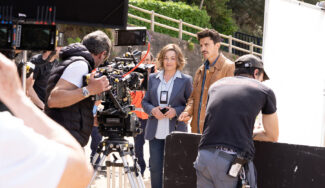 Now we are reaching a period of maturation in which the volume of production may begin to contract, which forces us to make more transversal series. You can no longer make 40 series, one for each niche: you will have to do 20 and many of them will have to be transversal to cover many types of viewers. This, as well as its commitment to live events, sports or concerts, will bring it closer to increasingly to commercial television platforms.
Now we are reaching a period of maturation in which the volume of production may begin to contract, which forces us to make more transversal series. You can no longer make 40 series, one for each niche: you will have to do 20 and many of them will have to be transversal to cover many types of viewers. This, as well as its commitment to live events, sports or concerts, will bring it closer to increasingly to commercial television platforms.
Along these lines, it also makes all the sense in the world to Coproductions. In the end, they are less harmful to platforms and allow you to have a larger catalog with less budget. You also still have a great capacity for control over the content and I think it does not harm at all the broadcast on traditional or free-to-air television, with a future or previous window on a platform. I think they are going to live together wonderfully and this is good news.
Recently, Alessandro Araimo (Executive Vice President & Managing Director Italy & Iberia de WBD (Warner Bros. Discovery), announced that the content strategy of its Max platform would go through Create more content Unscripted leaving largely fiction production to its American muscle. Could Spain rethink its industry to turn to the factual?
OF: Sure. We come from a A good time. Now, I understand that there is a small decrease in that part of economic investment, so we are going to have to get it right. In that sense, it seems to me that it is a very good opportunity to Re-Franchise.
It is very expensive to start a project. You have to make an extraordinary effort on the part of the platform to make a brand known, and I think it's time to make them profitable and serialize them. We return to a place that is very exciting for me: to make series or programs that have the capacity, from their genesis, to have more than one season. The effort made to launch a project it cannot be exhausted in such a short period of time; in some cases, for just one weekend. We have to go back to the serial broadcast part and, in that sense, we must manage a expertise to ensure the continuity of the series.
Daniel Écija: "We must create series, Unscripted or originals that Build a Brand. It is something that I've been obsessed with it. Why should we reduce a content to six, eight or ten chapters? Why?"
I think we have to be very efficient in the Return on investment. This thing that was common until a few years ago has to come back, and it has to be integrated into creativity. We must create series, Unscripted or originals that Build a Brand. It's something that has obsessed me. Why should we reduce content to six, eight or ten chapters? Why? If the effort is brutal and the pre-production periods are not less than a year.
To achieve this, we must have a Different approach to creativity, which has to be at the service from the first minute to generate long-term projects. This is the The only way to make all that effort profitable; not only the economic one, but also that of illusions, to give constancy and maintain a balance in the industry.
Franchising – an opportunity for Spanish production
Sometimes, there is some uncertainty about the continuity of the series beyond their first season, which may come from the opacity of audiences or decision-making on the platforms. Do you feel this pressure when it comes to proposing formats that can transcend this first season?
JL: I would say no. We always focus on making the best content together with the partner we have, whether it's a platform or a Broadcaster free-to-air, and I think that in the end what marks a second season is the success you may have had in the first. As Daniel says, the contents have to be Cost-effective and very transversal. Maybe we find a series that we like, but that does not have enough return at the audience level to maintain it, and which leads to a logical decision on the part of the platforms. At that point, what we have to do is look for content that we believe in, that has the Good Mood DNA and I combined so much Identity as a commercial capacity.
OF: Tactically and strategically, if we bet on series that generate a franchise, they have to be with a certain types of genres that facilitate it. On the other hand, I think that the different Players They have to Rethink your timelines, because if there is going to be a year and a half or two years between a first and a second season... It's tricky because it's a big rush for all of us, but I think if you have a hit, you have to reduce the release time between the two seasons, and that's something that needs to be thought out from the beginning.
Daniel Écija: "Tactically and strategically, if we bet on series that generate a franchise, they have to be with a certain types of genres that facilitate it."
Is the Spanish production market ready to overcome a possible decline in investment by its main customers?
JL: Being able to make so many series dedicated to niche markets has generated a Atomization in Spanish industry which is very positive. Now, with the reduction in investment, perhaps we are going to experience a concentration of production companies, which I don't think is a bad thing. During these years, a lot of talent has been generated in Spain because there has been much more Work, training and investment. Of course, it would be a shame not to take advantage of that.
Javier Lorenzo: "We must be very clear about who we want to be in the coming years five or ten years: a production company with a Very particular DNA that focuses on the Quality of your content and that it is very focused on the audience."
In this sense, some of the challenges we have is to achieve Protect standalone products, as well as to look for new ways to open the market to collaborations with the US Hispanic and Latin America.
OF: Fundamentally, we have to look for Lines of collaboration. Latin America is key for us: they have a tremendously mature industry and brutal producers. We are united by language and the way of Seek profitable production, as both sides have had to be very cautious and sensible.
What do you think will be the challenges that you will have to address, or at least be attentive to its evolution, in your goal of continuing to produce and create stories?
JL: We must be very clear about who we want to be in the next few years five or ten years: a production company with a Very particular DNA that focuses on the quality of its content and that is very focused on the audience. Once you have quality and commercial content, everything else comes by itself: the financing part is much simpler, as well as finding travel companions who want to accompany you. That's Our great competitive advantage, what we all base ourselves on and where we want to be and stay in the coming years.
Daniel Écija: "This is a Very beautiful craft, but sometimes of Extraordinary risk. We have to try not to Losing ground and keep working while We take great care of talent and we are permeable with society and with the Industrial Changes that is happening."
OF: Great scripts, great talent in front of and behind the camera, and partners, platforms and very complicit players going hand in hand to make some Outstanding content, designed for and with the public: I think this will continue to be the constant and will make everything much easier. This is a very beautiful job, but sometimes of extraordinary risk. We have to try not to lose ground and continue working while taking great care of talent and being permeable with society and with the industrial changes that are taking place. All with an extraordinary look at the viewer, who is in the end the one who is going to give you the return and will continue to allow Good Mood to be a production company that continues to grow. Hopefully.
An interview with Sergio Julián Gómez
Did you like this article?
Subscribe to our NEWSLETTER and you won't miss a thing.




